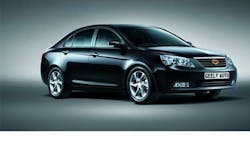Are Consumers Embracing Chinese-made Cars?
Where a car is manufacturered matters when consumers choose which car to buy, according to a new study from GfK.
Their research shows that 44% of those intending to buy a new vehicle in the future say its country of origin would influence their purchase decision. And among these “intenders,” 91% prefer U.S. autos, 67% choose German-made cars and 66% favor Japanese cars. Only 18% would consider a vehicle made in China.
When the firm specifically asked vehicle intenders how open they are to buying a vehicle from a Chinese company, only 7% of those ages 55 and over said they were “very” or “somewhat” open, compared to 33% for those under 35.
The reason for the low number with regard to China is due to issues of product quality and safety. Labor conditions, environmental regulations, and economic competitiveness between China and the U.S. also emerge as strong themes driving consumers away from considering Chinese vehicles, the research firm reports.
“Chinese vehicles clearly have a lot to prove in the U.S. market,” said Jeff Campana, senior vice president of GfK’s Auto practice in North America. “Verbatim comments from our respondents show that negative publicity about Chinese products in other categories – such as pet food and toys – have spilled over to create concerns about Chinese vehicles.
"And with nearly half of all new-vehicle intenders saying that country of origin matters to them, auto makers in China have reason to take action. A concerted campaign demonstrating their commitment to safety could be essential to opening the U.S. market to Chinese vehicles.”
Those who intend to buy a car are more open to considering Chinese vehicles, compared to those who are planning to buy a truck (21% for cars versus 13% for trucks). And intenders in the Midwest are least likely to be open to Chinese vehicles – just 11% in that region say they would consider a Chinese auto; the most open-minded region, in this instance, was the South (21%).
Among consumers who intend to buy a European vehicle, the percent who say they are “very” or “somewhat” open to buying a Chinese vehicle has risen slightly in the past four years, from 27% to 29%. But for those intending to get a Japanese auto, the level of openness has dropped from 29% to 22%. Intenders for domestic vehicles remain about equally open to Chinese brands compared to 2010.
The GfK Barometer of Automotive Awareness and Imagery Study revealed some common characteristics of new vehicle intenders who consider country of origin significant. They are more likely to be planning on buying a domestic vehicle, as opposed to a European or Japanese one; 51% intend to buy a domestic auto, compared to 42% for European vehicles and 38% for Japanese.
Intenders in the 55-plus age bracket are also more likely to care about country of origin than those under 35 (49% of 55+ intenders, versus 39% for under 35). And country-sensitive buyers are more heavily clustered in the Midwest (where 49% of intenders say place of origin matters) and the Northeast (46%).
